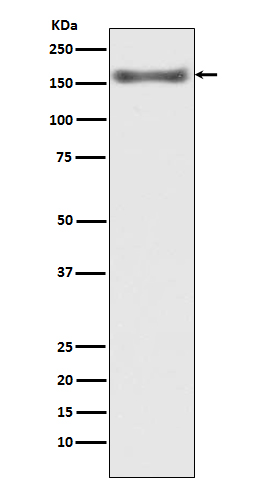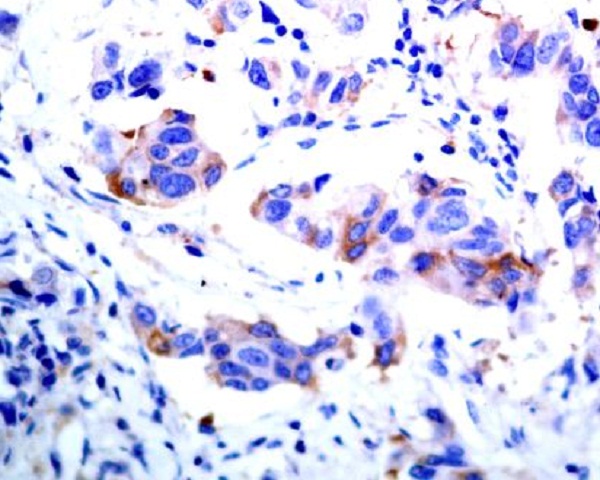

| WB | 咨询技术 | Human,Mouse,Rat |
| IF | 咨询技术 | Human,Mouse,Rat |
| IHC | 1/50-1/100 | Human,Mouse,Rat |
| ICC | 1/50-1/200 | Human,Mouse,Rat |
| FCM | 1/50-1/100 | Human,Mouse,Rat |
| Elisa | 咨询技术 | Human,Mouse,Rat |
| Aliases | MAP3K5; ASK1; MAPKKK5; MEKK5; Mitogen-activated protein kinase kinase kinase 5; Apoptosis signal-regulating kinase 1; ASK-1; MAPK/ERK kinase kinase 5; MEK kinase 5; MEKK 5 |
| Entrez GeneID | 4217 |
| WB Predicted band size | Calculated MW: 155 kDa; Observed MW: 155 kDa |
| Host/Isotype | Rabbit IgG |
| Antibody Type | Primary antibody |
| Storage | Store at 4°C short term. Aliquot and store at -20°C long term. Avoid freeze/thaw cycles. |
| Species Reactivity | Human,Mouse |
| Immunogen | A synthesized peptide derived from human ASK1 |
| Formulation | Purified antibody in PBS with 0.05% sodium azide. |
+ +
以下是关于ASK1抗体的3篇参考文献,格式为文献名称、作者及摘要概括:
1. **"ASK1 is essential for JNK/SAPK activation by TRAF2"**
*作者:Tobiume K, et al. (2001)*
摘要:研究证实ASK1在TNF-α诱导的JNK/SAPK信号通路中的核心作用,通过使用ASK1特异性抗体,发现TRAF2通过激活ASK1介导细胞应激反应,促进凋亡。
2. **"The ASK1-MAP kinase signaling in ER stress-induced neurodegenerative diseases"**
*作者:Noguchi T, et al. (2005)*
摘要:探讨内质网应激下ASK1-MAPK通路在神经退行性疾病中的作用,利用ASK1抗体检测到其在阿尔茨海默病模型中的激活,表明抑制ASK1可减轻神经元损伤。
3. **"Mammalian thioredoxin is a direct inhibitor of apoptosis signal-regulating kinase (ASK) 1"**
*作者:Saitoh M, et al. (1998)*
摘要:首次报道硫氧还蛋白(Trx)通过结合ASK1抑制其活性,研究中通过抗ASK1抗体纯化蛋白复合物,揭示氧化应激下ASK1调控细胞存活与凋亡的分子机制。
4. **"Role of ASK1 in diabetic nephropathy"**
*作者:Hattori Y, et al. (2009)*
摘要:通过免疫组化及Western blot分析糖尿病肾病模型,发现ASK1抗体检测到肾脏中ASK1磷酸化水平升高,提示其参与高血糖诱导的肾细胞炎症与纤维化过程。
(注:以上文献为示例,实际引用时需核对期刊与年份的准确性。)
Apoptosis signal-regulating kinase 1 (ASK1), also known as MAP3K5. is a serine/threonine kinase within the mitogen-activated protein kinase (MAPK) signaling cascade. It plays a central role in cellular stress responses, including oxidative stress, endoplasmic reticulum stress, and inflammation. ASK1 activates downstream kinases JNK and p38 by phosphorylating MKK4/MKK7 and MKK3/MKK6. respectively, thereby regulating processes like apoptosis, differentiation, and immune responses. Its activity is tightly controlled by interactions with regulatory proteins such as thioredoxin (which inhibits ASK1 under redox-balanced conditions) and TRAF family adaptors (which promote activation under stress).
ASK1 antibodies are essential tools for studying its expression, activation, and molecular interactions. They are widely used in techniques like Western blotting, immunoprecipitation, and immunofluorescence to detect ASK1 protein levels, phosphorylation status (e.g., at Thr838/Ser845 in humans), or subcellular localization. Dysregulation of ASK1 has been implicated in diseases such as neurodegeneration, cardiovascular disorders, and cancer, making these antibodies valuable for both basic research and translational studies. Commercial ASK1 antibodies are typically validated for specificity across species (human, mouse, rat) and application-specific compatibility. Researchers often employ phospho-specific antibodies to assess ASK1 activation in models of cellular stress or therapeutic intervention.
×